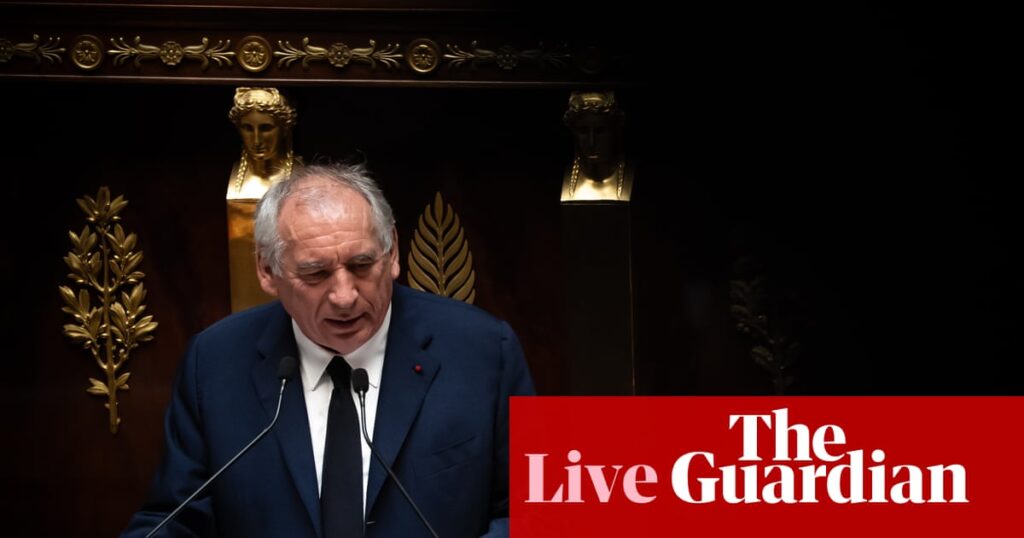Outsted PM Bayrou leaves Élysée after handing in his resignation
Angelique Chrisafis
in Paris
François Bayrou has left the Élysée after handing in his resignation to the president Emmanuel Macron.
Key events
And we now have an official confirmation of the resignation, via the government’s website.
“On 9 September 2025, the Prime Minister, François Bayrou, submitted his Government’s resignation to the President of the Republic, Emmanuel Macron, who acknowledged it.
The Prime Minister, along with the members of the Government, will handle current affairs until the appointment of a new Government.”
Outsted PM Bayrou leaves Élysée after handing in his resignation

Angelique Chrisafis
in Paris
François Bayrou has left the Élysée after handing in his resignation to the president Emmanuel Macron.
Lithuania to strengthen borders with Belarus and Russia during military exercise
Lithuania has also said it will strengthen its borders with Belarus and Russia during the Zapad military exercise, the country’s border guard said today.
The authorities said they would carry “even more active border monitoring, patrols, and other border control measures,” looking for any potential border violations and provocations against Lithuania.
They also said they will closely coordinate with other national and international partners in the process.
The scheduled “Zapad-2025” (West-2025) drills, to be held in western Russia and Belarus, have raised security concerns in neighbouring Nato member states Poland, Lithuania and Latvia, Reuters said.
The Zapad-2025 exercises will include drills on the possible use of nuclear weapons and the Russian-made, intermediate-range hypersonic Oreshnik missile, according to the Belarus defence minister.
‘We do not trust Putin’s good intentions,’ Poland’s president says
Separately, Poland’s president Karol Nawrocki warned earlier today that Russian president Vladimir Putin could invade other countries following his decision to attack Ukraine, AFP reported.
“We do not trust Vladimir Putin’s good intentions,” Nawrocki told reporters at a press conference with Finnish president Alexander Stubb in Helsinki.
“While waiting, of course, for a long-term peace, permanent peace, which is necessary to our regions, we believe that Vladimir Putin is ready to also invade other countries,” Poland’s president said.
“That is exactly why we are developing our armed forces, we are developing our partnership and our allied relations,” he added, without specifying any particular measures.
Stubb has meanwhile spoken to Trump regularly in recent months as European powers push to end the war in Ukraine.
“We try to explain that Putin cannot be trusted, that Putin is playing his usual delay tactics,” Stubb said.
Poland to close border with Belarus in response to Russian, Belarusian military exercises
As we wait for first pictures of Bayrou at the Élysée, we are getting reports from Poland with the country’s prime minister Donald Tusk declaring it will close its border with Belarus on Thursday as a result of the “very aggressive” Zapad military exercises taking place in Belarus.
Tusk said that it was also a response to a growing number of provocations from Russia and Belarus.
Bayrou heading to Élysée to hand in his resignation
Ousted French prime minister François Bayrou is reportedly heading to the Élysée Palace to hand in his resignation just now, Reuters reported.
We will keep an eye on this and bring you the pictures as soon as we have them.
Majority in EU’s biggest states believes bloc ‘sold out’ in US tariff deal, poll finds

Jon Henley
Europe correspondent
A majority of people across the EU’s five biggest member states believe the European Commission sold citizens out when negotiating a “humiliating” tariff deal with Donald Trump that “benefits the US” far more than Europe, a survey has shown.
The poll, by Cluster17 for the European affairs debate platform Le Grand Continent, found 77% of respondents – ranging from 89% in France to 50% in Poland – thought the deal would benefit above all the US economy, with only 2% believing it would benefit Europe’s.
Across the five countries, which accounted for about 60% of the bloc’s population, an average of 52% described the deal agreed in July by Trump and the European Commission president, Ursula von der Leyen, as a “humiliation”.
Under the deal, the EU is to remove tariffs on all US industrial goods and provide preferential market access for a wide range of US seafood and agricultural goods. Most EU goods entering the US, however, will be subject to a 15% baseline tariff.
More than 20 dead in Russian attack in Donetsk region, Zelenskyy says
More than 20 people were killed in an overnight Russian attack on Yarova in the Donetsk region, Ukrainian president Volodymyr Zelenskyy has just said in a social media post.
He called it “a brutally savage Russian airstrike,” stressing it hit “directly on people, ordinary civilians” when they were handed out pension payments.
There are no words. Such Russian strikes must not be left without an appropriate response from the world.
He added:
“The world must not remain silent. The world must not remain idle. A response is needed from the United States. A response is needed from Europe. A response is needed from the G20.
Strong actions are needed to make Russia stop bringing death.”
Germany’s Merz calls for ‘more flexibility’ on transition to electric cars
Elsewhere, German chancellor Friedrich Merz called for “more flexibility” from the EU in the transition to electric cars as resistance grows over plans to phase out combustion-engine vehicle sales by 2035.
“We are of course committed to the transition to e-mobility,” the conservative leader told the opening of the IAA motor show in Munich, but added that “we need smart, reliable and flexible European regulation,” AFP reported.
Picking up the language of car manufacturers, Merz argued that the EU should not limit itself to “a single solution,” but see “a competition between the best ideas, the best technologies.”
He also noted growing competition “especially from China and the US,” insisting that “our response cannot be market isolation and regulation,” but “technological leadership, Made in Germany.”
Merz also talked about the potential for automated driving in Europe, and more digitally enabled road technologies to manage traffic and reduce accidents.
Norway’s Labour Party got ‘clear majority’ for its government plans, PM Støre says
And over to Oslo, where the country’s prime minister Jonas Gahr Støre has been speaking with reporters.
He admits he’s had little sleep, but feels “very good” after the last night’s win.
He said “the choice was between a Labour Party government and a Progress Party government, and we got a clear majority for our alternative,” saying his party “needs to take this responsibility very seriously.”
He expected to meet with the other centre-left parties this and next week to start talks, but was confident “we will find solutions.”
He said he’s had lots of messages from other leaders, including a call from Canada’s Mark Carney at 2:30am.
He said he wants the popular former Nato secretary general Jens Stoltenberg to remain his finance minister.
In a brief reaction in English, he said:
“Well, it’s it’s a good result. It’s a clear result. It demonstrates that centre left social democracy can win elections even when there are winds blowing from the right. …
We will build on the Norwegian model, which is based on opportunities for all, fair distribution and the modern approach to how we develop our knowledge base, how we cut emissions, how we live up to our international obligations and bring more people into activity.
That’s one of the main targets for me, to lift performance and levels in our schools and higher education, and to allow those under 30 to get into the labour market early and not drop out. So there’s a lot to follow up.
And Norway is also a leading energy nation, important for Europe, providing about 35% of Europe’s gas. We will continue to be a reliable partner, but also to take forward technological shifts, cut emissions and live up to our climate obligations.”
‘Our message to Russia is simple: this war is not winnable,’ EU’s foreign policy chief tells lawmakers
EU foreign policy chief Kaja Kallas addressed the (pretty empty) European parliament’s plenary in Strasbourg this morning opening a debate on Ukraine.
But what she said is still worth noting, as the EU mulls its next steps and how to respond to Russia’s increasingly assertive position on (not) ending the war.
Kallas noted that while “international efforts to end Russia’s war have stepped up in the last few months, Russia’s response is more aggression.”
“Over the weekend, Russia launched the largest aerial assault of this war so far. Putin has zero interest in peace, and he will not stop the war until he’s forced to. … The only option we have is to pile more pressure on Russia, provide more support to Ukraine and prepare for the day after.”
She said the bloc was working on the new, 19th, package of sanctions against Russia, working with international partners to ensure their maximum effect
“We are also coordinating with our partners, because the impact of the internationally coordinated sanctions is much stronger than EU is acting alone.
Our message to Russia is simple: the war is not winnable. Leave the battlefield and come to the table with Ukraine.
When this happens, Russia must not be allowed to rearm and reattack. We have been there before, and Putin has made no secret that Ukraine is just the start.
Putin wants to reestablish Russia’s pre 1991 Soviet sphere of influence, but the West is united in providing security guarantees to Ukraine, there are now serious pledges on the table of the coalition of the willing.”
Kallas also criticised Vladimir Putin’s threat to attack western peacekeepers in Ukraine, saying:
“Last week, Putin threatened attacks on any western presence on the ground, including peacekeepers. This is a serious escalation from Russia, and directly undermines European security. Russia does not have a say on how we defend ourselves.”
She ended:
“What Russia may have thought inevitable is far from it. Russia has not broken Ukraine’s resolve, and it must not break ours.
For those who doubt: don’t. Ukraine’s security is European security, and so long as Russia pursues its illegal war, we must continue to fight.”
Morning opening: Bon, et maintenant?

Jakub Krupa
Bonjour.
After a dramatic debate in the National Assembly last night, the ousted French prime minister François Bayrou is expected at the Élysée Palace today to formally resign from the post, starting the clock for president Emmanuel Macron to name the next person to take on the impossible mission of passing the budget in the current, extraordinarily divided, parliament.
The new PM will be named “in the next few days,” the Élysée said last night, but that could mean anything. Does Macron have someone ready and raring to go?
Over in Norway, the mood is very different as the Labour Party celebrates its electoral win, securing four more years in government after seeing off a surge of support for the populist right in a polarised election. The prime minister, Jonas Gahr Støre, is doing a victory lap this morning.
But before we join him in Oslo, we will start with the European Parliament, where lawmakers are discussing the next steps for Ukraine after the largest-ever air attack of the war over the weekend.
I will bring you all the key updates here.
It’s Tuesday, 7 September 2025, it’s Jakub Krupa here, and this is Europe Live.
Good morning.

